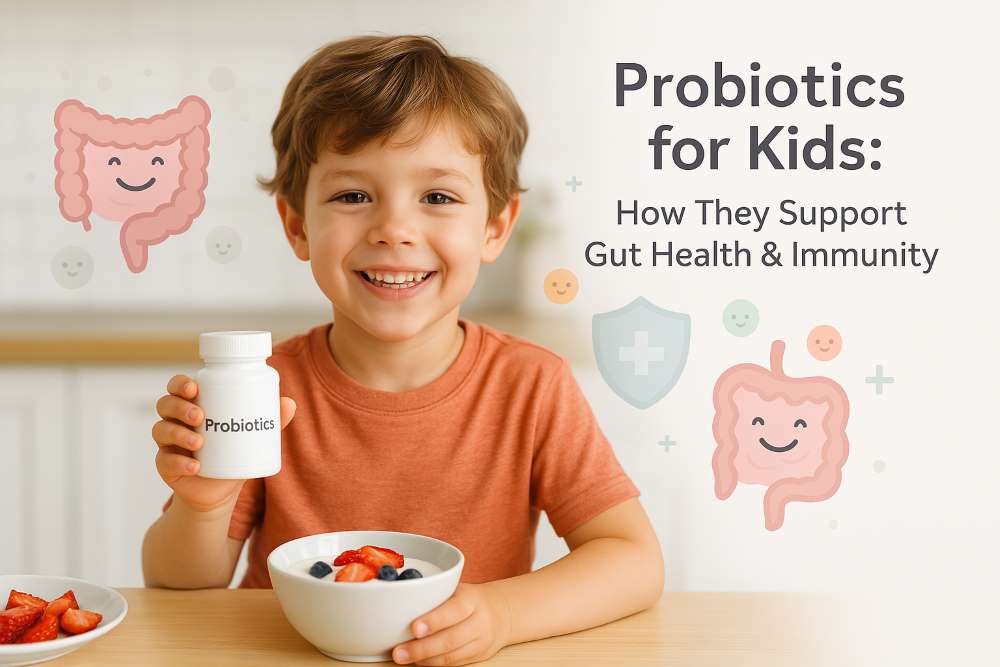
Introduction:
As children's immune and digestive systems are still developing, they have highly sensitive guts. With the help of probiotics for kids to support their gut health, parents can improve the overall well-being of their children. Pediatricians often recommend probiotics to children if they have recently taken antibiotics, experienced digestive issues, or have recurrent infections. Restoring gut health is the best way to make your child feel energetic and happy.
It is possible to maintain a healthy gut microbiota with an adequate amount of both probiotic foods and supplements. Many parents are already familiar with probiotics for adults, but they are not aware of the health benefits of probiotics for kids.
Parents desire the best for their children. Our expert asked parents why they give probiotic supplements to their children. They answered they wanted to support their children's immunity and respiratory system, especially when they get sick more often due to seasonal infections. So, they give probiotics. Also, when children undergo treatment with antibiotics, their intestinal microbiota gets disrupted. Parents give probiotics to their children during those times as well.
Health benefits of probiotics for kids
Probiotics work by introducing beneficial gut bacteria. Here is a summary of their most important health benefits:
-
Improve the digestive health of children
Kids probiotics improve digestive health by aiding the breakdown of food and nutrient absorption. Children with healthy gut microbiome do not experience gas, bloating, diarrhea, or constipation.
-
Enhance immunity
70% of immunity lies in the gut. Probiotics improve immunity through better gut health. With a strong immune system, your child can fight infections and common colds easily. Doctors say that children with healthy gut are less likely to become sick.
-
Promote good mood
The gut and brain are connected through the gut-brain axis. A healthy gut produces serotonin, which regulates mood and emotions. Parents notice behavioral changes in their children as they become more irritable when they have digestive issues. Probiotics improve mood in children by supporting the gut-brain axis.
-
Beneficial after antibiotic course
Side effects like diarrhea, abdominal pain, IBS, and acute gastroenteritis arise after using antibiotics for kids. Probiotics are useful to relieve these symptoms.
-
Beneficial in digestive issues
Probiotics relieve diarrhea and constipation, improve bowel movements, and reduce colic symptoms. It can also be useful for managing abdominal pain and bloating.
-
Other benefits of probiotics for kids
Probiotics may prevent atopic dermatitis and eczema. They can be useful to reduce the risk of repeated ear infections and gastrointestinal allergies.
Probiotic-rich food vs probiotic supplements for kids
Parents can choose the best probiotic support for their children either through probiotic-rich foods or high-quality supplements.
Yougurt, kefir, sauerkraut and miso are the best food options.
Start slowly with these options. Let your children choose their favorite yogurt flavor. Also, add prebiotic-rich food like bananas, onions, oats, etc.
For picky eaters or children who have dietary restrictions, parents can choose supplements in different forms like kids' probiotic gummies, chewables, powder, drinks, etc. Experts at Nutriessential recommend only high-quality probiotic supplements formulated specifically for children with strains that are beneficial for children.
No matter what you choose for your child, diet, or supplements, you need to be consistent in giving them daily probiotics.
Different types of probiotics for kids: How to Choose the Right One?
A high-quality probiotic for kids contains research-based strains that work naturally with the kid's microbiome. Some of the best probiotic for kids are:
-
Probiotic gummies for kids: These gummies are soft, easily chewable, and available in different delicious flavors. They usually contain a combination of probiotics and prebiotics. These are a good option for daily digestive and immune support for kids aged 3 and up.
-
Probiotics with fiber for kids: The combination of probiotics and fiber restores bacterial balance, supports bowel regularity and reduces digestive upset. This ensures the smooth functioning of the child's digestion.
-
Kids multivitamin with probiotic chewables: These chewables are a combination of multivitamins and probiotics. They can be taken easily by kids aged 3-12 years. These can support healthy growth and development along with supporting gastrointestinal microbiome by increasing the number of good bacteria.
-
Probiotic drinks: Children can take these drinks as a part of meals or snacks. These can be easily incorporated into the daily routine. Look for a flavor that excites your child and suits their taste preferences. In addition, these drinks also contain nutrients like vitamin D and calcium.
-
Probiotic powder for children: These are a versatile option as they can be mixed into beverages and foods like smoothies, yoghurt, or cereal, without changing the taste. The shelf life is longer and it does not require refrigeration. Dr. Mercola Probiotic powder supplement is a good choice and is available in natural raspberry flavor.
-
Probiotic sachets: These can be added to your child’s favorite beverage, milk, or porridge.
Choosing the best probiotic for your child
Here are some tips for parents for choosing the best probiotic supplement for their children.
-
Know these common strains: Lactobacillus rhamnosus, Lactobacillus acidophilus, Saccharomyces boulardii and Bifidobacterium lactis are common strains of probiotics for kids. Make sure to look for these when you are choosing a probiotic supplement.
-
Check for specific strain for a specific condition: Lactobacillus rhamnosus strain reduces the duration and incidence of upper respiratory infections by 38%. The best probiotic for kids constipation contains lactobacillus plantarum and Bifidobacterium breve. Saccharomyces cerevisiae is beneficial for diarrhea. Lactobacillus rhamnosus is highly effective in reducing antibiotic associated diarrhea. Lactobacillus salivarius may improve eczema and is also helpful for children with asthma.
-
Choose the right CFU: Probiotics work only when they are consumed in the right amounts. So make sure to choose a high-quality probiotic supplement for kids that have sufficient CFUs. A dose of 1 to 10 billion CFUs daily is recommended for children.
-
Look for more alternatives: There are many options when it comes to probiotics for kids, such as chewables, gummies, capsules, powder, and liquid drops. Choose the one that your kid can easily consume.
-
Check the label: It is very important to check the label for certain strains that can be more beneficial for specific conditions. Lactobacillus reuteri improves colic symptoms in breastfeeding infants. Lactobacillus and Bifidobacterium species may prevent upper respiratory tract infections (URIs). Bacillus subtilis reduces the frequency of respiratory and gastrointestinal tract infections.
-
Beneficial combo: Supplements with the combination of prebiotics and probiotics are highly advantageous because the prebiotics stimulate probiotic bacteria growth in the intestine while supporting immunity and addressing symptoms like diarrhea or constipation.
-
Prioritise quality: Choose high quality probiotics for kids because they do not contain unnecessary fillers, preservatives, colorants, heavy metals, or other contaminants.
-
Check the storage requirements: Some probiotics contain strains resistant to high temperatures. So, they need not be kept in the fridge.
What Parents Think About Probiotics for Kids? A Study Gave Useful Insights
Parents are well familiar with the benefits of probiotics for kids. They add probiotics to their child’s diet. If parents have a high level of knowledge about probiotics and they themselves have consumed it, then they also prefer giving probiotic supplements to their children. The main motive for introducing probiotics is to help children get relief from digestive issues and achieve better health outcomes for diarrhea, antibiotic treatment, constipation and gut health maintenance.
What experts look into probiotics for kids?

According to experts, the following considerations are important when choosing the best probiotics for kids:
-
Scientific evidence: A recent study published in BMJ Paediatrics Open found that Probiotics improve gastrointestinal and behavioral symptoms of autistic children by improving gut health and microbiota balance. Improvements were reported in average stool consistency, daily flatulence, discomfort and moderate-to-severe abdominal pain. The research also highlighted that probiotic strains like Saccharomyces boulardii and Lactobacillus strains improved behavior along with social interaction. Bifidobacterium and Lactobacillus strains improve speech/communication and sociability in autistic children.
-
Child-specific formulas: Experts say that probiotic supplements for adults are not recommended for children.
-
Quality: Experts say that a high quality probiotic for children is one that has clinically researched strain, provides an effective dose, can be used safely in children and has specific strains parents are looking for to address specific digestive issues in their children.
-
Clean ingredients: To get this, you need to choose high-quality brands like Dr Merola, Garden of Life, etc, because these brands do not use artificial ingredients, artificial dyes, preservatives, or flavorings in their supplements.
-
Taste: Most of the kids are picky eaters. You can choose gummies or chewables of their favorite flavor or a flavorless powder that can be mixed into anything. This way, they can take the probiotics easily.
-
Choice: It is important to choose the probiotic depending on the concern like diarrhea, constipation, etc. Different probiotics have different strains.
-
Recommendation: Choose paediatrician-recommended probiotic brands
-
Probiotic gummies for children: Always look for zero-sugar or low-sugar gummies.
Side effects of probiotics for kids
Usually, kids do not experience side effects after taking probiotics but some may experience bloating and gas for some time because gut takes some time to adjust. These symptoms resolve gradually. The best way is to start with a low dose.
FAQs
-
Can kids take probiotics?
Yes, kids can take different types of probiotic supplements to boost gut health and immunity.
-
Are probiotics good for kids?
Probiotics are live microorganisms. They are naturally present in certain foods and probiotic supplements are also available. These, when used in sufficient amounts are beneficial for digestive and overall health.
-
Can kids take adult probiotics?
No, kids should not take adult probiotics. Probiotics for adults don't work the same way for kids.
-
Are probiotics good for digestive health?
A study found that parents give probiotic supplements to their children to help them in
-
Relieving constipation
-
Reducing gas and bloating
-
Reducing diarrhea frequency
-
Improving mood
-
Overcoming common colds and allergies
-
Antibiotics cause diarrhea, gas, and cramping so probiotics relieve these symptoms.
The use of probiotics during pregnancy and early infancy has been associated with reducing the risk of problems like atopic dermatitis, antibiotic-associated diarrhea and pediatric acute infectious diarrhea.
-
Are probiotics for kids safe?
Probiotics are safe for kids; however, there are some exceptions. Probiotics should not be given to children with compromised immunity or premature infants because, in such cases, they increase the risk of infection.
Conclusion
Adding probiotics to your child’s daily routine is very effective and supportive of digestion and immunity. Parents should not underestimate or overlook the importance of probiotics in maintaining the overall health of their children. Make sure to connect with an expert to get the right recommendation on probiotics for kids.



























